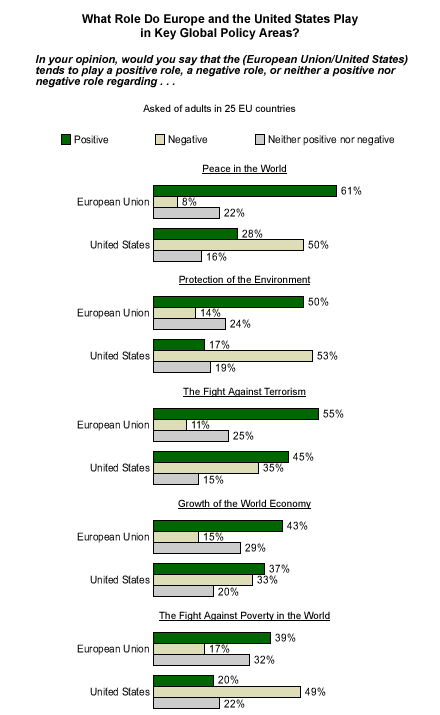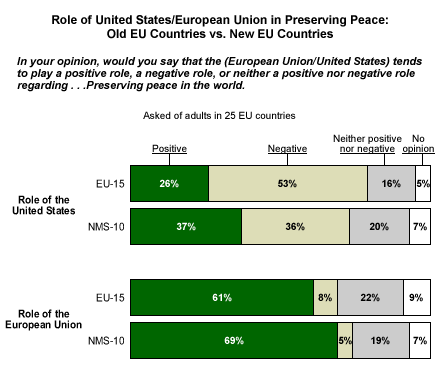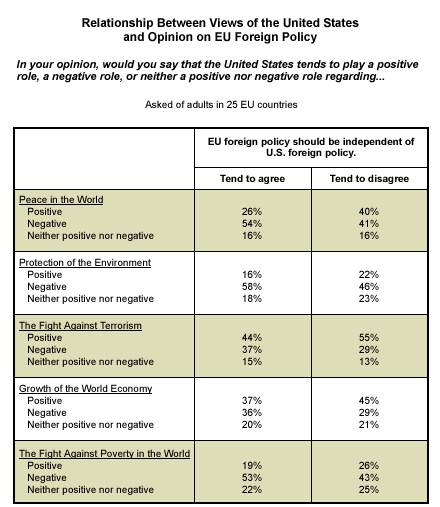What do citizens of the 25 European Union (EU) countries -- including the 10 new EU members -- think about the roles that the United States and the EU play on the world stage? In the fall of 2003, the Eurobarometer survey*, administered by Gallup, tested Europeans' dispositions toward the United States and the EU in five areas -- peace in the world, fighting terrorism, growth of the world economy, fighting world poverty, and protection of the environment -- by asking them whether the United States and the EU tend to play a positive or a negative role in each of these areas.
EU Citizens Express Negative Views of the United States
More EU citizens think the United States tends to play a negative rather than a positive role when it comes to preserving peace in the world (negative role: 50%; positive role: 28%). Citizens are also more likely to attribute a negative role than a positive one to the United States in fighting world poverty (negative: 49%; positive: 20%), and to condemn the U.S. role in protecting the environment (negative: 53%; positive: 17%).
Slightly more EU citizens attribute a positive rather than a negative role to the United States in two areas: the fight against terrorism (positive: 45%; negative: 35%) and accelerating global economic growth (positive: 37%; negative: 33%).

Not all European nations share these negative attitudes toward the global role of the United States. In the 10 new EU member states (NMS-10) -- where President George Bush gained political support for his military plans to oust Saddam Hussein -- the United States is not nearly as badly perceived as it is in the 15 states (EU-15) that were EU members prior to 2004. In the NMS-10, even the U.S. role in preserving peace in the world is seen marginally positively (positive: 37%; negative: 36%), and with regard to the other four areas, NMS-10 citizens are significantly more likely to attribute a positive rather than a negative role to the United States.
However, citizens of the new member states also tend to be more positive than EU-15 citizens about the EU's global role. In fact, the gap between the NMS-10 and the EU-15 evaluations of the EU's role is not much different from the gap in their evaluations of the U.S. role.

Larger EU nations tend to be more critical of the United States than do smaller nations. Looking at the role of the United States in preserving peace in the world, the six largest EU countries (Germany, Great Britain, France, Italy, Spain, and Poland) give this a 27% positive rating and a 53% negative rating. In the 19 smaller countries, 31% offer a positive rating here, while 45% are negative. The same pattern prevails in the other four policy domains.
Europeans Have a Bright Self-Image
Gallup recently asked the same questions of U.S. poll respondents and found that Americans are more likely to give high ratings to the United States than to the EU (see "Americans Know Little About European Union" in Related Items). In much the same way, EU citizens are more likely to see the European Union than the United States in a positive light.
The fight against terrorism -- the attribute on which the United States is rated most favorably in the eyes of EU respondents -- receives an 11% negative assessment for the EU. By contrast, the most unfavorable EU attribute in the eyes of EU citizens -- the fight against world poverty -- is evaluated negatively by just 17% of respondents. Sixty-one percent of EU citizens believe the European Union plays a positive role in preserving peace in the world; 28% say the same about the United States. Similarly, 50% believe the EU plays a positive role in protecting the environment, while only 17% believe the same of the United States.
The smallest gap between EU respondents' ratings of the United States and their ratings of the European Union is on growth of the world economy: 43% believe the EU plays a positive role, versus 37% who believe the same of the United States.
Few Europeans Wish to Maintain Transatlantic Ties in Global Politics
Overall, 74% of EU citizens agree that the European Union's foreign policy should be independent from that of the United States, while only 11% disagree. Not surprisingly, respondents' level of desire for a distinctive European role in global politics relates to how people regard America's global role.
Europeans who positively evaluate the role the United States plays in maintaining peace and fostering global economic growth tend to be slightly less likely to feel that EU foreign policy should be independent of U.S. foreign policy, while those who negatively evaluate the U.S. role in these areas are slightly more likely to advocate an independent foreign policy.

*The fieldwork of this Eurobarometer survey was conducted in the fall of 2003 in each of the 25 current member states of the European Union, including 25,207 citizens in total. For results based on this sample, one can say with 95% confidence that the maximum error attributable to sampling and other random effects is ±1 percentage points on EU-25 level.
For results based on the samples of 16,082 EU-15 citizens and of 9,125 NMS-10 citizens, the maximum margins of sampling error are ±1 percentage point. For results based on the samples of 6,424 citizens of large EU nations and of 18,783 citizens of small EU nations, the maximum margins of sampling error are ±1 percentage point.
In addition to sampling error, question wording and practical difficulties in conducting surveys can introduce error or bias into the findings of public opinion polls.
